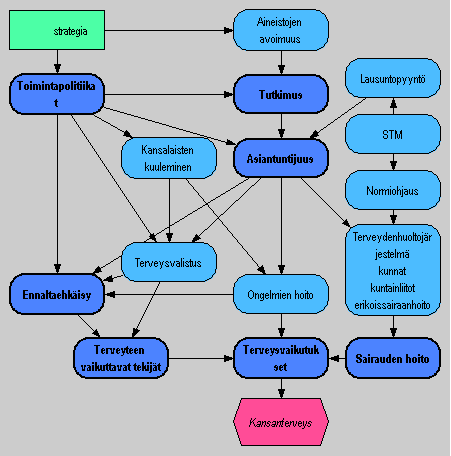Assessment on Institute of Public Health and Welfare
Assessment on Institute of Public Health and Welfare
Scope
Purpose
What are the main strategic tasks, way of working, and organisational structure for a governmental institute of public health and welfare (called NIPHW for short)? The purpose of the institute is to maintain and promote the health, well-being, and social welfare of the citizens of a nation and also internationally. The institute is a national research and expert institute. It is not directly responsible for maintaining the national health care system or providing health care services, unless some specific tasks are given to the institute on a national level.
The purpose of the institute is fulfilled by doing scientific research; promoting health and preventing diseases and social discrepancy; protecting people against health threats; developing the health care system; maintaining and developing health-related information systems; doing expert work and dissemination among the administration and stakeholders; promoting health-related innovations; maintaining an efficient management system; and acting internationally in the domain of public health and welfare.
Boundaries
The aim of this assessment is to define the properties of such a national institute in general. Any country interested can then adopt the basic solutions and emphasise those parts that are especially important for that country. The institute is expected to be functional for the contemporary world (2008), and the expected life span of the institute is at least 20 years. The institute should be applicable in a developed western society, but the basic concept should be functional enough to be adaptable to a small or a large developing country.
Scenarios
None defined.
Intended users
- Ministries of social affairs and health in various countries.
- Existing institutes of public health, social affairs, or welfare.
Participants
- This is an open assessment, therefore anyone interested may participate, if he/she accepts the rules of open assessment.
- Especially, we hope that people from existing similar institutes will participate, as they have practical expertise needed in this work. Possible institutes include, but are not limited to
Definition
Decision variables
- Structure of organisation of NIPHW: Is the organisation based on scientific methods, substance areas, or a mixture?
Indicators
- Scientific information produced by NIPHW.
- Information produced for informing societal decision-making.
- Information produced for citizen health education.
- Development of societal infrastructures to prevent health threats.
- Public health situation in the country.
- Social welfare in the country.
- International recognition of NIPHW.
Value variables
- None defined.
Other variables
Health and welfare research
- Follow-up of the public health situation
Promotion of health and welfare and preventing diseases and social discrepancy
Protection of people against health threats
Development of the health care system
Maintenance and development of health-related information systems
Expert work and dissemination among the administration and stakeholders
- Promotion of health-related innovations
- What are the areas where specific promotion of innovations are needed?
- Research activity of NIPHW
- Cooperation and R&D at boundaries of disciplines
- Networking of education and innovations
- Strategic centres for research
- What are the strategic areas where there should be a national strategic research centre?
- Promotion of R&D with universities and sister institutes of NIPHW
Maintenance of an efficient management system
International actions in the domain of public health and welfare.
- Departments of NIPHW
- What are the departments of NIPHW? (Dependent on Structure of organisation of NIPHW).
- Dept of chronic diseases
- Dept of infectious diseases
- Dept of environmental health
- Dept of social equity
- Dept of lifestyle diseases
- Dept of developing child
- Dept of
Indices
- None defined.
Analyses
- None defined.
Result
Results of indicators and analyses
- Not yet available.
Conclusions
- Not yet available.
